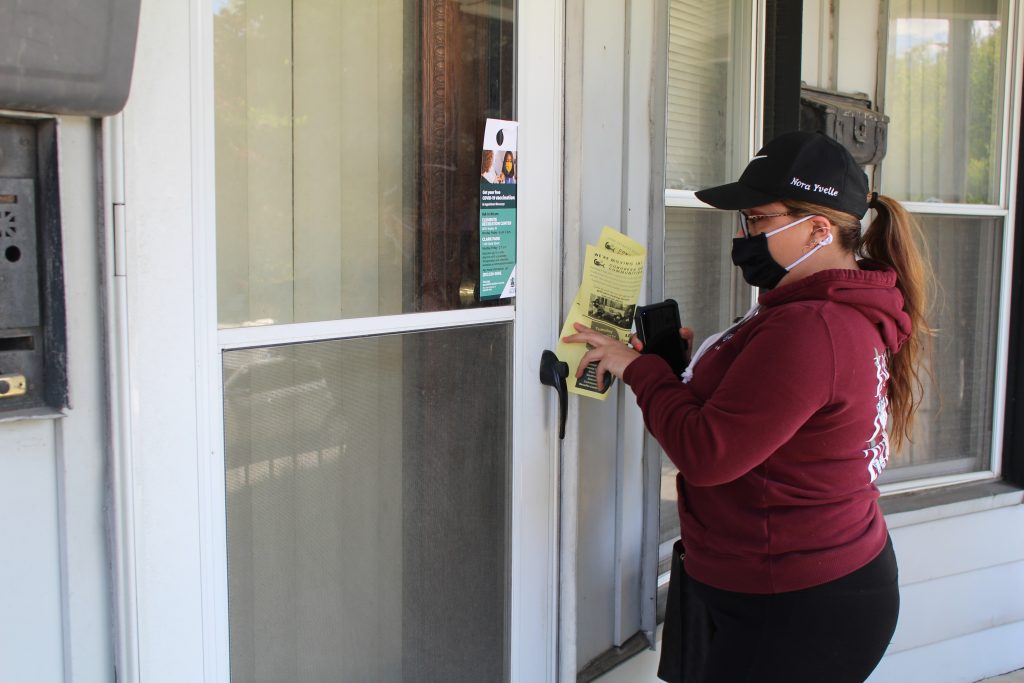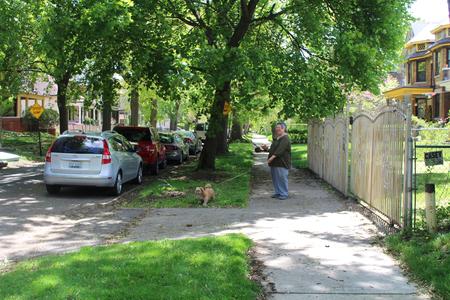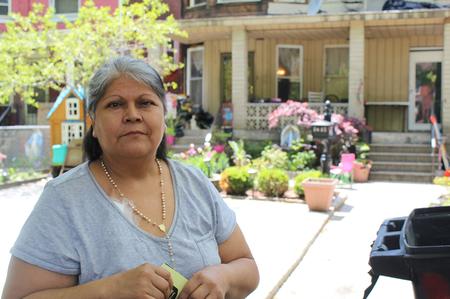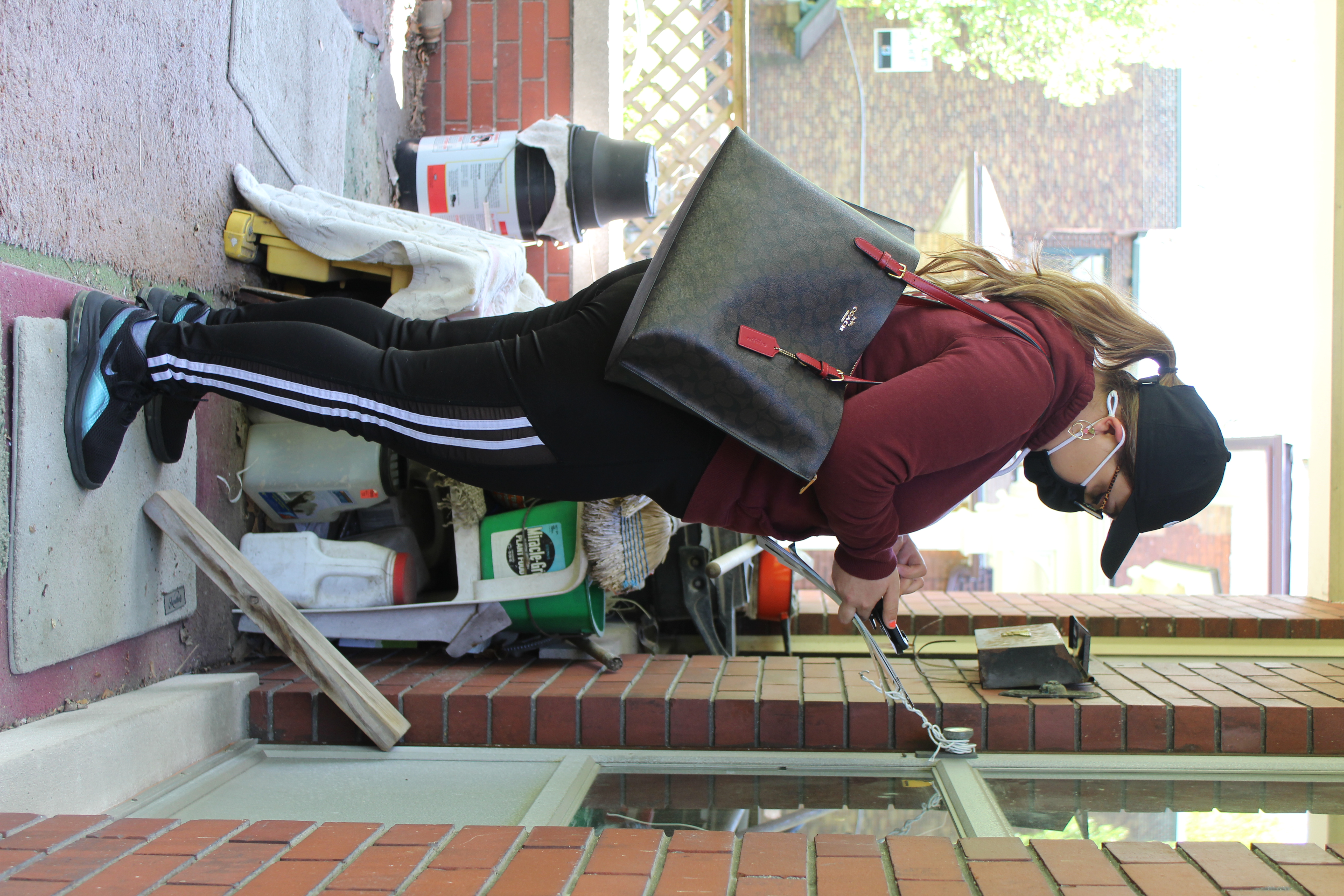COVID-19 Vaccine Ambassador Knocks on Doors in Southwest Detroit: “It’s Worth Somebody’s Life”
As vaccination rates in Detroit lag behind the rest of the state, canvassers like Nora Rodriguez are working with the City of Detroit to reach people who need more time or information.

Nora Rodriguez, 31, walks down tree-lined Hubbard Street in Southwest Detroit, holding a stack of pamphlets and moving from house to house.
“Basically what we’re doing is we’re going door to door, and we have an app here that we’re using, and we’re letting families know that they can get the vaccination. There’s ways that you can get vaccinated without actually getting an appointment,” says Rodriguez.
Rodriguez is a bilingual Vaccine Ambassador for Congress of Communities. The nonprofit is one of three groups hired by the City of Detroit with Federal Emergency Management Agency money to do on-the-ground outreach like this. The effort comes as vaccination rates in Detroit lag behind the rest of the state. While Michigan is around 57% (for residents ages 16 and older), Detroit is closer to 35%.
The city’s goal with the canvassing is to let residents know that there’s a clinic in the neighborhood where they can get a free COVID-19 shot. Officials also want to give people a chance to talk face-to-face about vaccines with someone from their community.
Listen: Spend some time with a Vaccine Ambassador, knocking on doors for the City of Detroit.

Rodriguez grew up in Southwest Detroit and is familiar with the neighborhood. From conversations she’s had so far, Rodriguez says her Latino neighbors are hesitant about getting the vaccine for a number of reasons. Some people who are undocumented are afraid they might be reported to immigration authorities. And young people, around her age, often have beliefs taken from social media.
“They feel like it’s to target people and to kill populations off and stuff like that, but it’s not anything to do with that,” says Rodriguez.
“Every door is worth something. It’s worth somebody’s life.” –Nora Rodriguez, Vaccine Ambassador
On Hubbard Street, Rodriguez passes lots of two-story homes built in the first half of the last century.
“I love these houses over here, that’s so pretty,” Rodriguez says as she walks up to a brick one with a large front porch. Rodriguez says she and her mom used to cruise up and down streets like Hubbard, singing along to the radio and admiring the homes.
“I’d be like ‘Ma, look at these houses!’” recalls Rodriguez. “You know these are things that you can’t get back if you lose your parent or you lose somebody you love a lot.”
Rodriguez gave her mom COVID-19 after she got sick herself in April 2020. Her mom survived but Rodriguez isn’t willing to risk either of them getting sick again. That’s why Rodriguez got the vaccine and convinced her mom to do the same.
“You have to just be careful because you can get another strain of the virus. And there’s other things out there that we don’t know,” she says.

After knocking on a few doors, Rodriguez steps up to a white duplex with overgrown grass. As she walks to the front door, she passes an eviction notice taped to the window, but she isn’t deterred. Rodriguez was trained to try every door, unless it’s an apartment complex or there’s a loose dog. No one answers.
Detroit officials say about 70% of residents don’t open up, according to data from 20,000 houses that canvassers have approached since the initiative began about a month ago. When a door goes unanswered, Rodriguez and the other canvassers leave behind a pamphlet. It shows the hours, contact info and location of the nearest city-sponsored walk-in clinic where people can get vaccinated. Residents can also text their address to 313-217-3732 to find the vaccination location nearest them, the pamphlet says. And it says residents can call 313-876-4000 to ask a nurse any questions they might have about vaccines.
When a person does answer the door, Rodriguez says canvassers aren’t supposed to try to convince them to get vaccinated. Instead they’re told to “avoid debating or arguments by basically giving them a smile, give them the information, and say ‘I understand you and I respect your opinion. And here’s the information if in the future you want to change your mind,’” says Rodriguez. “If somebody is not into the vaccination that’s all you can really do.”
City data shows that about one in five residents have no plans to get a COVID-19 vaccine. That, however, is not who this canvassing is targeting. The city says these door knockers are trying to reach people who need more time or information.
Hoping to Make a Difference
On our outing, Rodriguez interacts with only three people. Two of them are Spanish-speaking seniors who say they’re vaccinated. The third is 50-year-old Manuel Gonzales. When Rodriguez approaches his front gate, Gonzales is sitting on his porch wearing an Eminem T-shirt.
“OK if I come in?” Rodriguez asks.
“Alright,” responds Gonzales.
“I got an Eminem shirt, too. I love him. And it’s just like that, black and white,” Rodriguez says as she approaches. Gonzales laughs.
“Alright, so basically I work within the city. I’m a resident here in Southwest Detroit,” says Rodriguez. “Did you know that there is free places where you can get vaccinations?”
“The shot?” asks Gonzales.
“Yeah, for COVID-19,” says Rodriguez.

“Does that work?” asks Gonzales.
“Well, I got my vaccine and I’ve done a lot of research on it. I was really hesitant about it as well…” says Rodriguez
“Because … when I take the flu shot I get real sick,” explains Gonzales.
Rodriguez asks if he’s talked to his doctor about the COVID-19 vaccines. Gonzales says no but he he’s supposed to see her in June.
“My stepdad, he got his two shots,” Gonzalez says.
“Oh did he?” asks Rodriguez.
“Yeah,” says Gonzales. “After the second shot he started having shakes.”
“Oh really?” says Rodriguez.
“Yeah. And then when he told me that, I said ‘I don’t want that shot,’” says Gonzales.
Symptoms from the COVID-19 vaccines usually mean that the shot is working. While other side effects do happen, they are extremely rare.
“Yeah, a lot of things have side effects,” says Rodriguez.
“I just don’t know what my side effects are gonna be, that’s the thing,” says Gonzales, who’s diabetic.
After talking for more than five minutes, Gonzales says he’s still worried about vaccine side effects, but he’ll probably get a shot so he can apply for a warehouse job that he heard requires vaccine cards.
“Because when they ask for the card, if I don’t have the card, I don’t have a job,” says Gonzales. “So eventually, when I go see my doctor, if she asks for it I’ll probably get my first shot when I go there.”
When Rodriguez walks away, she has no way of knowing if Gonzales will actually get vaccinated. But she hopes interactions like this make a difference.
“A lot of people I’ve known have gotten the COVID, like myself as well. And some have unfortunately not made it,” says Rodriguez. “So, the bigger impact for me is to go door to door because every door is worth something. It’s worth somebody’s life.”
Currently, the City of Detroit is only canvassing in the neighborhoods surrounding its six walk-in vaccinations clinics. In the coming weeks, canvassers will expand to other neighborhoods, with the goal of eventually knocking on every door in the city.
Trusted, accurate, up-to-date
WDET is here to keep you informed on essential information, news and resources related to COVID-19.
This is a stressful, insecure time for many. So it’s more important than ever for you, our listeners and readers, who are able to donate to keep supporting WDET’s mission. Please make a gift today.
